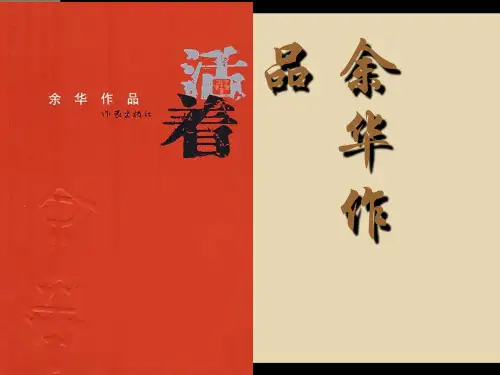《活着》余华完美版
- 格式:ppt
- 大小:1.96 MB
- 文档页数:25


![《活着》——余华[文字可编辑]](https://uimg.taocdn.com/e01085d05727a5e9846a6149.webp)
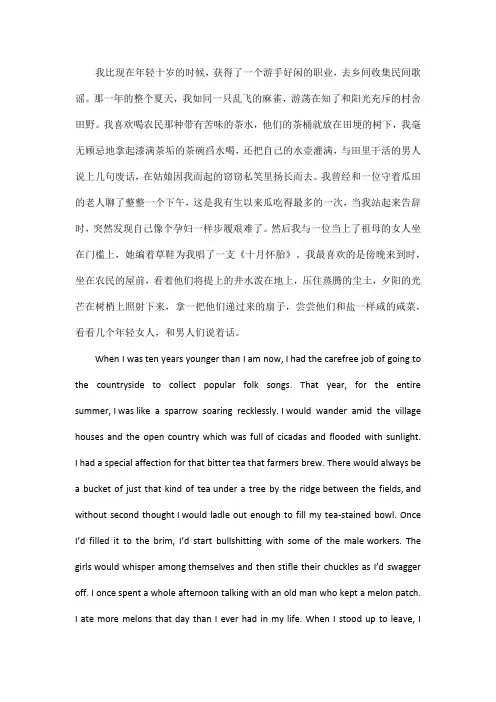
我比现在年轻十岁的时候,获得了一个游手好闲的职业,去乡间收集民间歌谣。
那一年的整个夏天,我如同一只乱飞的麻雀,游荡在知了和阳光充斥的村舍田野。
我喜欢喝农民那种带有苦味的茶水,他们的茶桶就放在田埂的树下,我毫无顾忌地拿起漆满茶垢的茶碗舀水喝,还把自己的水壶灌满,与田里干活的男人说上几句废话,在姑娘因我而起的窃窃私笑里扬长而去。
我曾经和一位守着瓜田的老人聊了整整一个下午,这是我有生以来瓜吃得最多的一次,当我站起来告辞时,突然发现自己像个孕妇一样步履艰难了。
然后我与一位当上了祖母的女人坐在门槛上,她编着草鞋为我唱了一支《十月怀胎》。
我最喜欢的是傍晚来到时,坐在农民的屋前,看着他们将提上的井水泼在地上,压住蒸腾的尘土,夕阳的光芒在树梢上照射下来,拿一把他们递过来的扇子,尝尝他们和盐一样咸的咸菜,看看几个年轻女人,和男人们说着话。
When I was ten years younger than I am now, I had the carefree job of going to the countryside to collect popular folk songs. That year, for the entire summer, I was like a sparrow soaring recklessly. I would wander amid the village houses and the open country which was full of cicadas and flooded with sunlight.I had a special affection for that bitter tea that farmers brew. There would always bea bucket of just that kind of tea under a tree by the ridge between the fields, and without second thought I would ladle out enough to fill my tea-stained bowl. Once I’d filled it to the brim, I’d start bullshitting with some of the male workers. The girls would whisper among themselves and then stifle their chuckles as I’d swagger off. I once spent a whole afternoon talking with an old man who kept a melon patch.I ate more melons that day than I ever had in my life. When I stood up to leave, Isuddenly realized that I had as much difficulty walking as a pregnant woman. Later that day, I sat on the porch with a woman who had already become a grandmother. As she weaved a pair of straw sandals she sang “Ten Month Pregnancy” for me. What I loved most was sitting before the peasants’ houses, just as dusk fell. As the sun’s rays came down through the delicate b ranches. I would watch the peasants pour well water onto the ground, cooling the hot dust and sand. Holding the fan they passed over to me, I would try the pickled vegetables, which always tasted like salt. I would watch the girls and talk with the men.我头戴宽边草帽,脚上穿着拖鞋,一条毛巾挂在身后的皮带上,让它像尾巴似的拍打着我的屁股。
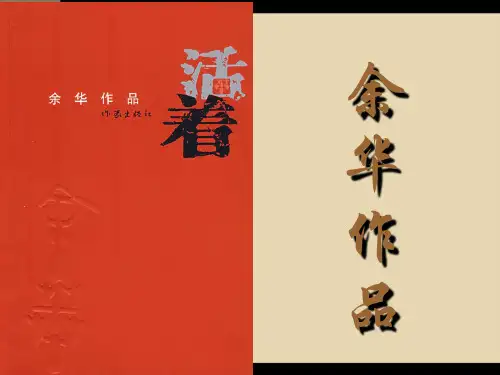
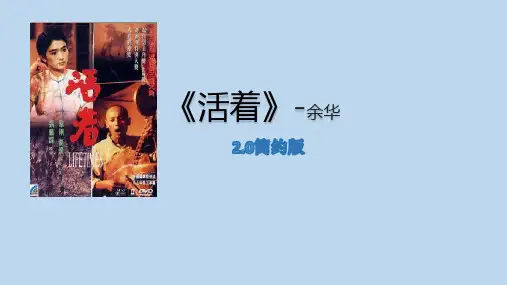

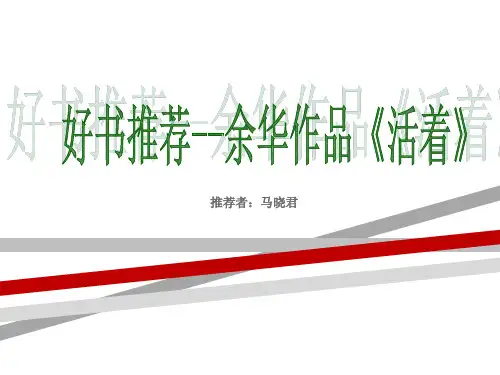
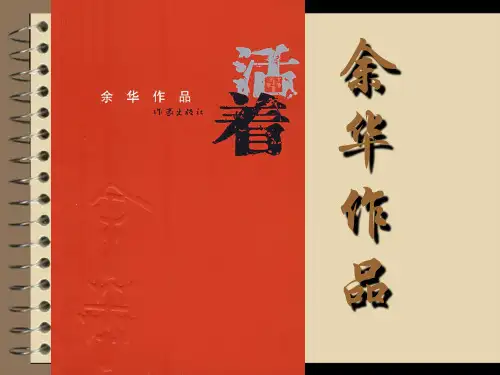
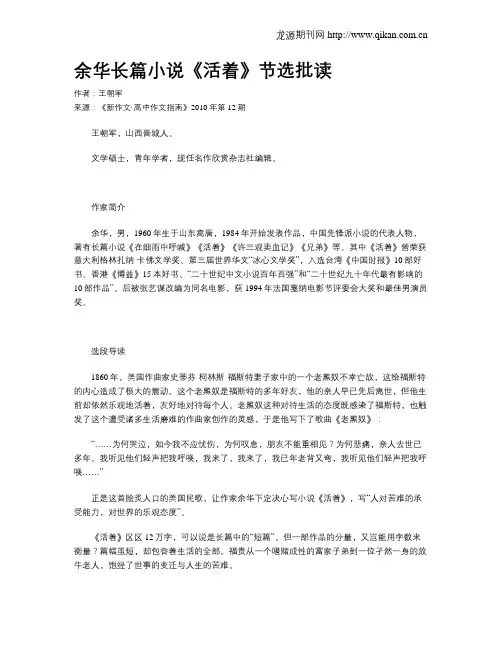
余华长篇小说《活着》节选批读作者:王朝军来源:《新作文·高中作文指南》2010年第12期王朝军,山西晋城人。
文学硕士,青年学者,现任名作欣赏杂志社编辑。
作家简介余华,男,1960年生于山东高唐,1984年开始发表作品,中国先锋派小说的代表人物,著有长篇小说《在细雨中呼喊》《活着》《许三观卖血记》《兄弟》等。
其中《活着》曾荣获意大利格林扎纳·卡佛文学奖、第三届世界华文“冰心文学奖”,入选台湾《中国时报》10部好书、香港《博益》15本好书、“二十世纪中文小说百年百强”和“二十世纪九十年代最有影响的10部作品”。
后被张艺谋改编为同名电影,获1994年法国戛纳电影节评委会大奖和最佳男演员奖。
选段导读1860年,美国作曲家史蒂芬·柯林斯·福斯特妻子家中的一个老黑奴不幸亡故,这给福斯特的内心造成了极大的震动。
这个老黑奴是福斯特的多年好友,他的亲人早已先后离世,但他生前却依然乐观地活着,友好地对待每个人。
老黑奴这种对待生活的态度既感染了福斯特,也触发了这个遭受诸多生活磨难的作曲家创作的灵感,于是他写下了歌曲《老黑奴》:“……为何哭泣,如今我不应忧伤,为何叹息,朋友不能重相见?为何悲痛,亲人去世已多年。
我听见他们轻声把我呼唤,我来了,我来了,我已年老背又弯,我听见他们轻声把我呼唤……”正是这首脍炙人口的美国民歌,让作家余华下定决心写小说《活着》,写“人对苦难的承受能力,对世界的乐观态度”。
《活着》区区12万字,可以说是长篇中的“短篇”,但一部作品的分量,又岂能用字数来衡量?篇幅虽短,却包容着生活的全部。
福贵从一个嗜赌成性的富家子弟到一位孑然一身的放牛老人,饱经了世事的变迁与人生的苦难。
如果说父亲因“我”输光家产而一命归天是“我”人生轨迹发生戏剧性转折的开始,那么接下来所发生的一切,才是“我”成为一个普通人之后,体验到的真正的“生活”。
母亲、儿子、爱妻、女儿、女婿,这些至亲之人曾经是“我”对生活尚抱有希望的依凭,但他们的相继亡故,却又一次次让“我”跌落到冰冷的谷底,即便是“我”唯一的外孙都没有逃脱死神的眷顾。
